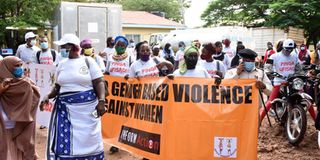Equality: Cracking the code on the shadow pandemic

Activists and civil societies mark the 16 days of activism against gender-based violence in Isiolo town on December 8, 2020.
Covid-19 has proven to be fertile ground for heightening racial and gender inequalities, further compromising health systems across the world. With it has come a full blown shadow pandemic of gender-based violence (GBV).
The pandemic has drastically increased GBV and reduced access to prevention and response services for GBV survivors.
It has also debilitated economies, compounding the increase in violence and harmful practices like female genital mutilation and child marriage.
According to the World Health Organization (WHO), one in three women experience physical or sexual violence at some point in their lives.
GBV cases are even starker in Africa. According to a WHO study on regional and global estimates of violence against women, GBV prevalence is higher in Africa with 45.6 per cent of women experiencing it compared to 35 per cent of women worldwide. South Africa has the highest rate of intimate femicide.
Physical violence
In Kenya, 45 per cent of women have experienced physical violence, and 14 per cent sexual violence.
The International Centre for Research on Women, Ford Foundation, and the Bill and Melinda Gates Foundation convened an event bringing together governments of South Africa and Kenya, civil society organisations and the private sector from around the world to call for support for the Beijing Declaration and Platform for Action, in which elimination of violence against women is one of 12 key areas of action.
2020 marked the 25th anniversary of the Beijing Platform for Action.
It will be commemorated through the UN Women’s Generation Equality Forum convened by UN Women and co-hosted by France and Mexico this year.
Through the Generation Equality process, 2021 is a moment for reflection and action to strengthen partnerships.
Beijing’s promise
The process has identified GBV as a key thematic area. We need to address gaps and ensure game-changing actions live up to Beijing’s promise.
As countries design Covid-19 economic recovery plans, it is time to establish synergies between GBV and economic justice and rights action coalitions of the Generation Equality process.
The moment calls for scaling up of evidence-based feminist coordinated initiatives rooted in the grassroots.
Women’s rights organizations and young feminist networks have been in the frontline of gender-based response and prevention efforts on GBV.
A report by Mama Cash and AWID ‘Moving Money to the drivers of Change’ outlines that while feminist movements are key drivers of transformative change, they receive only one per cent of gender-focused aid. Another report by the International Rescue Committee ‘Where is the Money’, says GBV services accounted for 0.12 per cent of the $41.5 billion allocated for humanitarian funding from 2016-2018, while only one per cent to end SGBV reached women’s groups.
Continental commitment
Without sustainable funding for programs that address real need, there’s little chance for meaningful progress.
It is crucial to address legislative gaps, reinforce implementation of existing laws, and tighten legal and policy reform, to provide a holistic justice mechanism for GBV survivors.
During the event hosted on December 3, Mmabatho Ramagoshi, a Special Advisor in South Africa (SA) government, outlined the need to look beyond a nationally-focused approach and emphasized SA’s efforts in rallying other African nations through African Union mechanisms to agree on a continental commitment to end violence against women and femicide.
Eunice Musiime from Akina Mama wa Afrika, asked African States to ratify ILO C-190 that outlines actions governments should take to address GBV in the workplace.
Prevention programs
While there is a link between GBV and economic empowerment, the implementation of the two processes is often siloed in prevention programs, leading to slow progress. Country director of UN Women Kenya Anna Mutavati, outlined the rise in GBV cases due to lockdowns and urged governments to ensure response to GBV, key to economic recovery and Covid-19 response plans.
Eva Muraya of the Kenya Private Sector Alliance, noted the importance of women’s economic empowerment through strengthening entrepreneurship to address GBV.
While funding is a major obstacle to preventing GBV, lack of an intersectional lens and approach to GBV perpetuates stereotypes, violence and discrimination against women and girls. Irene Ogeta, from the Athena Network reminds us of how GBV has a cause-and-effect relationship with HIV and the psychosocial impact GBV has on survivors.
To effectively address GBV, governments must come together. Ms Ramagoshi spoke about SA’s efforts to address femicide in collaboration with CSOs and the private sector. She was backed by Prof Collete Suda Kenya’s PS for Gender who highlighted their commitment to end cross border FGM.
It’s our responsibility to move these actions forward. Otherwise, the Generation Equality forum will pass by with little meaningful action. We must commit to rolling up our sleeves and ending all forms of GBV.
Catherine Nyambura is the lead consultant for Generation Equality in Kenya for the International Centre for Research on Women (ICRW)
Nancy Moloantoa is a Program Associate at the Ford Foundation for the Office of Southern Africa.




